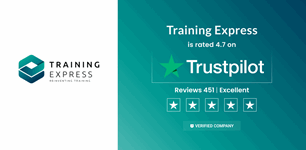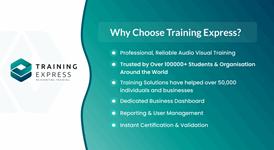Ecommerce Startup Manager
CPD Accredited | Free PDF & Hard Copy Certificate included | Free Retake Exam | Lifetime Access
Training Express Ltd
Summary
- Certificate of completion - Free
- Certificate of completion - Free
- Exam(s) / assessment(s) is included in price
- Tutor is available to students
Add to basket or enquire
Overview
If you’ve ever considered working as a Ecommerce Startup Manager but felt like you lack the knowledge and skills to launch your career, this course might be what you want! The Ecommerce Startup Manager course will allow you to equip yourself with a solid foundation and develop more advanced skills on that foundation. Enrol today to learn all the required knowledge and skills to pursue a rewarding career in the relative industry.
The Ecommerce Startup Manager course is for both beginners and those already working in the field. It covers gradually from basics to advanced concepts of being a successful Ecommerce Startup Manager. Anyone passionate about learning can take this course and develop skills and a portfolio to have a competitive edge in the job market. Also, upon completing our Ecommerce Startup Manager course, you will get a widely respected accreditation and a deeper knowledge of the topic.
Key Benefits
- Accredited by CPD
- Instant e-certificate
- Fully online, interactive course
- Self-paced learning and laptop, tablet, smartphone-friendly
- 24/7 Learning Assistance
CPD
Course media
Description
Curriculum
Section 01
⦁ Introduction to Building Your Model
⦁ Role of Marketing
⦁ Importance of Modern Marketing
⦁ Framework for Building Your Marketing Model
⦁ Step 1: Know Your Numbers
⦁ HOMEWORK: KNOW YOUR NUMBERS
⦁ Step 2: How to Measure the Right Numbers
⦁ The Art of Experience Mapping
⦁ The Buying Process
⦁ HOMEWORK: BUYER JOURNEY QUESTIONS
⦁ Step 3: Conversion Rates
⦁ Do You Know Your Industry Averages?
⦁ Step 4: Building Your Model
⦁ Knowing the Value of a Lead
⦁ HOMEWORK: BUILD YOUR MODEL
⦁ Step 5: Building Your Scenarios
⦁ HOMEWORK: BUILD YOUR FUNNEL
⦁ Practical Campaign Models
⦁ Next Steps
Section 02
⦁ Introduction to the Belief Framework
⦁ Rule 1: Everybody has Beliefs
⦁ Rule 2: Belief is a Strong Motivator
⦁ Rule 3: Belief Precedes Behavior
⦁ Rule 4: All Beliefs can be developed
⦁ Rule 5: Beliefs can be measured
⦁ The 5 Belief Framework Principles
⦁ Principle 1: Act like a Mentor
⦁ Belief Framework: Definition of Mentorship
⦁ Belief Framework: A Mentor is Other-Centered
⦁ Belief Framework: A Mentor is Authentic
⦁ Belief Framework: A Mentor is Empathetic
⦁ Belief Framework: A Mentor is an Authority
⦁ Belief Framework: A Mentor is Committed
⦁ Principle 2: Your Customer is Human
⦁ Introduction to Personas
⦁ HOMEWORK: DEFINING YOUR TARGET MARKET
⦁ Elements of a Good Persona
⦁ Telling Your Persona’s Story
⦁ HOMEWORK: PERSONAS
⦁ Principle 3: Identify and Establish the Need
⦁ Defining Consumer Needs
⦁ Discovering Your Genuine Contribution
⦁ Create or Satisfy Needs?
⦁ HOMEWORK: IDENTIFY AND ESTABLISH THE NEED
⦁ Principle 4: You Have the Solution
⦁ Journey Specific Solutions
⦁ HOMEWORK: ESTABLISHING THE SOLUTION
⦁ Content Types per Stage
⦁ HOMEWORK: DEFINING THE BUYING PROCESS
⦁ Principle 5: People Respond to Direction
⦁ Ad & Brand Exposure
⦁ Two Types of Actions
⦁ Creating the Belief Framework
⦁ HOMEWORK: THE BELIEF FRAMEWORK
⦁ Values-Based vs Fear-Based Marketing
⦁ Features vs Benefits
Section 03
⦁ Introduction to CRO
⦁ Defining Conversion
⦁ Building Your Conversion Plan
⦁ STEP 1: MEASURE
⦁ 3 Primary Methods of Data Analysis
⦁ Data Tools and Tags
⦁ HOMEWORK: INSTALLING TOOLS
⦁ Important KPIs@
⦁ Funnel Pages
⦁ HOMEWORK: DASHBOARD & REPORTS
⦁ HOMEWORK: SEGMENTS xxxx
⦁ STEP 2: ANALYZE
⦁ Funnel Touchpoints
⦁ Hypothesize
⦁ Prioritize
⦁ HOMEWORK: CRO WORKLOG
⦁ STEP 4: DESIGN
⦁ Mobile Design
⦁ Buzzword Compliance
⦁ User Experience
⦁ Consumer Focus
⦁ What’s Missing?
⦁ STEP 5: IMPLEMENT
⦁ STEP 6: LEARN
⦁ Key CRO Takeaways
Section 04
⦁ Introduction to SEO
⦁ Defining Modern SEO
⦁ The 5 Primary Keys of SEO
⦁ Common SEO Myths and Misconceptions
⦁ Why is SEO Important?
⦁ The SEO Plan
⦁ PART 1: TECHNICAL SEO
⦁ Wrapped into Next Video
⦁ Meta Tags
⦁ Meta Tag: Title
⦁ Meta Tag: Description
⦁ URL Construction
⦁ Duplicate Content
⦁ PART 2: CONTENT
⦁ Stage 1: Keyword Research
⦁ 4 Steps of Keyword Research
⦁ HOMEWORK: KEYWORD LIST
⦁ Stage 2: Content Audit
⦁ Conducting a Content Audit
⦁ Stage 3: Competitor Analysis
⦁ HOMEWORK: SITE COMPARISON
⦁ Stage 4: User Experience
⦁ PART 3: LINKING
⦁ Internal Linking
⦁ External Linking
⦁ Link Flywheel
⦁ Link Types
⦁ Link Building Strategies
⦁ Social’s Impact on SEO
⦁ HOMEWORK: SOCIAL INFLUENCERS
⦁ METRICS
⦁ Metric: Keyword Rankings
⦁ Metric: Backlinks & Linking Root Domains
⦁ Metric: Organic Traffic
⦁ Metric: Average Time-On-Page
⦁ Metric: Pages Per Session
⦁ Metric: Returning Users
⦁ Metric: Bounce Rate
⦁ Metric: Page Speed
⦁ Metric: Traffic By Device
⦁ Metric: Conversions
Section 05
⦁ Introduction to Content Engagement Plan
⦁ Modern Marketing Funnel
⦁ Why Content Fails
⦁ What Makes Content Valuable?
⦁ Interactive Content
⦁ Personalize Content
⦁ Full-Funnel Content Plan
⦁ Defining Content Type
⦁ Consumer-Centric Content
⦁ STAGE 1: TOFU CONTENT
⦁ TOFU Spotlight: Social Media
⦁ TOFU Content Examples
⦁ STAGE 2: MOFU CONTENT
⦁ MOFU Goals and Tactics
⦁ MOFU Content Examples
⦁ STAGE 3: BOFU CONTENT
⦁ BOFU Goals and Tactics
⦁ BOFU Content Examples
⦁ STAGE 4: RETENTION CONTENT
⦁ Retention Goals and Content Types
⦁ Retention Content Examples
⦁ Measuring Success
⦁ HOMEWORK: CONTENT ENGAGEMENT PLAN
Section 06
⦁ Introduction to Multi-Channel Lead Acquisition
⦁ DATA INFORMED
⦁ Primary Success Metrics
⦁ Syncing Your Accounts
⦁ Tracking & UTM Codes
⦁ HOMEWORK: UTM CODES
⦁ Custom Dashboards
⦁ HOMEWORK: DASHBOARD & REPORTS
⦁ HOMEWORK: SEGMENTS xxxx
⦁ ALL CHANNELS ARE PART OF THE JOURNEY
⦁ INTEGRATED MARKETING COMMUNICATIONS (IMC)
⦁ IMC Defined
⦁ IMC Strategy
⦁ IMC Examples & Marketing Mix
⦁ DEVICE AGNOSTICISM
⦁ BRANDED STYLE GUIDE
⦁ Manual of Styles
⦁ Example Style Guides
⦁ CHANNEL: EMAIL
⦁ Email Metrics
⦁ Email Design
⦁ Email Personalization
⦁ Lead Nurturing Campaigns
⦁ Different Types of Lead Nurturing Emails
⦁ Growing Subscribers
⦁ CHANNEL: SOCIAL
⦁ LinkedIn
⦁ Facebook
⦁ Twitter
⦁ YouTube
⦁ Other Social Networks
⦁ CHANNEL: SEARCH MARKETING
⦁ #1: Be Found at Every Stage
⦁ #2: Drive Dual Strategies
⦁ #3: Boost Conversions
⦁ #4: Dominate the SERPs
⦁ #5: Conversions
⦁ Integrate, Don’t Separate
⦁ CHANNEL: REMARKETING
⦁ Why Remarketing Works
⦁ Different Types of Remarketing
Course Assessment
You will immediately be given access to a specifically crafted MCQ test upon completing an online module. For each test, the pass mark will be set to 60%.
Certificate
Once you’ve successfully completed your course, you will immediately be sent a digital certificate. Also, you can have your printed certificate delivered by post (shipping cost £3.99). Our certifications have no expiry dates, although we do recommend that you renew them every 12 months.
Who is this course for?
The Ecommerce Startup Manager training is ideal for highly motivated individuals or teams who want to enhance their skills and efficiently skilled employees.
Requirements
There are no formal entry requirements for the course, with enrollment open to anyone!
Career path
Learn the essential skills and knowledge you need to excel in your professional life with the help & guidance from our Ecommerce Startup Manager training.
Questions and answers
Currently there are no Q&As for this course. Be the first to ask a question.
Certificates
Certificate of completion
Digital certificate - Included
Certificate of completion
Hard copy certificate - Included
Reviews
Currently there are no reviews for this course. Be the first to leave a review.
Legal information
This course is advertised on reed.co.uk by the Course Provider, whose terms and conditions apply. Purchases are made directly from the Course Provider, and as such, content and materials are supplied by the Course Provider directly. Reed is acting as agent and not reseller in relation to this course. Reed's only responsibility is to facilitate your payment for the course. It is your responsibility to review and agree to the Course Provider's terms and conditions and satisfy yourself as to the suitability of the course you intend to purchase. Reed will not have any responsibility for the content of the course and/or associated materials.




